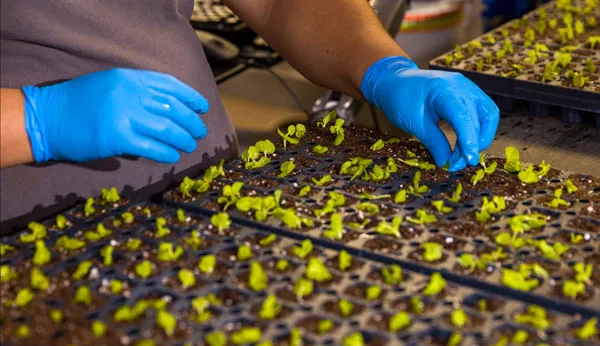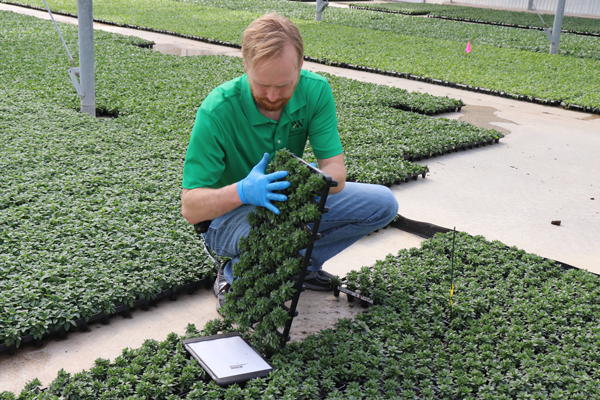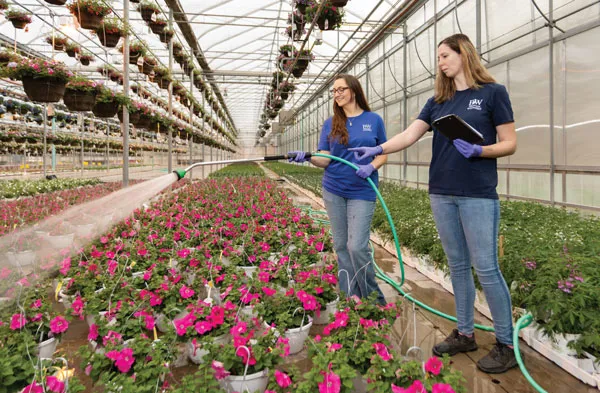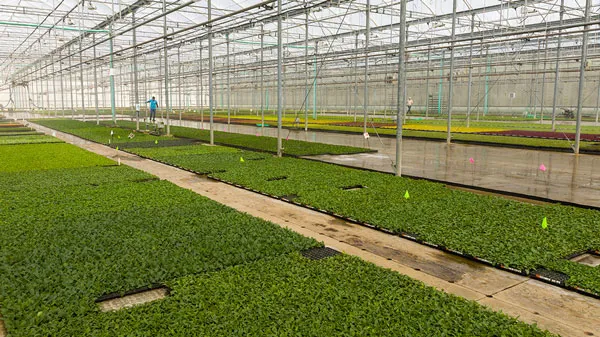Producing a live product can present unique challenges. But having processes in place will help growers provide healthy plants to their customers and avoid costly slip-ups. At Four Star Greenhouse, quality is a daily, top-of-mind goal, and for Robin Bourdon, Senior Manager of Growing Personnel, it is her main job. Along with Amanda Vallade, Training, and Development Grower Manager, Bourdon is responsible for hiring and training all of the section growers who work with plants, and she is familiar with the challenges the industry faces regarding finding good employees. She says a commitment to quality is built into the system at Four Star.

It all starts at the beginning with quality cuttings, Bourdon says. The team works very closely with suppliers to ensure cuttings meet the specifications needed. “We also discuss the nutritional status and any chemistries they have used, so if we need to apply anything, it won’t be the same mode of action – to avoid building up resistance in the pest or pathogen populations,” says Bourdon. “And as a preventative measure, we are constantly testing – sending hundreds of samples out weekly to the lab to test for viruses and other issues.”
Bourdon says action plans are in place for every crop. The Product Line Manager (PLM) makes sure the needs of each crop are clear to everyone, so the plants will finish on time. This includes nutrition, transplanting, pinching, and preventative fungicides and pesticides. In addition to traditional methods, she says a sizeable biological program is in place. Two full-time IPM (integrated pest management) specialists regularly scout for insects and diseases to catch small problems before they become big ones. And before shipping, a production team makes sure every tray is 100% full with liners of the consistent size that meet Four Star’s quality standards.

Taking time to train pays off
Keeping eyes on the plants is vitally important, and making sure employees know what to look for is a key part of Bourdon’s job. So is knowing what to look for when hiring new workers. She has been working at Four Star for 33 years, beginning as part of the transplanting team.
“Most of our workers don’t have a formal education in plants,” Bourdon says. “We look for good people who pay attention to details and have a team spirit. We want people who will support each other and are willing to learn.”
Once hired, new employees are given a crash course in greenhouse production. The University of Florida Institute of Food and Agricultural Sciences (UF/IFAS) training program is one of the first resources, but Four Star provides continuing training in the form of webinars or conference attendance. And for the first week or two out in the greenhouse, they work closely with experienced team leaders, continuing to be monitored by PLMs and other team members.
“There’s nothing like getting out into the greenhouse and experiencing it firsthand,” Bourdon says. “The team leaders teach them the lay of the land, the plants, and how to water. A lot of time is spent training new workers and making sure they have the knowledge they need to be successful.”

Asked what she sees as the biggest roadblocks to quality from her perspective, Bourdon says, “overwatering and temperature.” With fuel prices being so high right now, growers are tempted to save money and keep things a bit cooler, but that doesn’t usually work out too well, she says. While some crops can be grown a little cooler, most need optimum temperatures until just before shipping.
Teaching when and how much to water is always a challenge. “Overwatering is harder for a plant to overcome than underwatering, and that’s a point we have to make when training. Many people assume that if you’re not sure, it’s better to add water to be safe. And that’s exactly the opposite of what we want.”
Because Four Star grows such a wide variety of crops, automated watering isn’t possible in all the houses, so hand watering is an important skill. Bourdon’s team uses a system that rates moisture levels from 1 (bone dry) to 5 (saturated and dripping). They also teach employees to remove and lift plugs to visually look at them and to learn to gauge moisture levels by weight. Bourdon says the levels in between are a bit subjective and depend on the crop and the grower’s preference.

“Depending on what it is, I’ll grow between a 2 and 3, but a lot of people like to be between a 3 and 4,” Bourdon says.
The training, while time-consuming, pays off in the results.
“One of our largest customers visited our facility recently, and he was amazed at how many different items we have that are cared for by hand, and everything was still so uniform,” Bourdon says. “One of their lead growers was very complimentary, and that’s always what you want to hear.”

Constant communication between team members and managers is key, especially in the spring when things are moving very quickly, Bourdon says. “It’s vital that everyone knows what their job is and what they need to look for so nothing is missed. Empowering employees with the knowledge they need to feel successful also ensures a quality product.”
For more informatio n:
n:
Four Star Greenhouse
Tel.: 734-654-6420
mail@pwfourstar.com
www.pwfourstar.com
